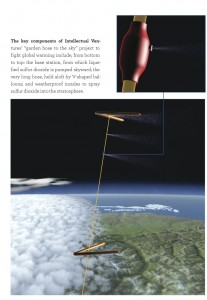Does the Public Want Geoengineering? (And: Does It Need a New Name?)

As someone who has written about geoengineering (and been hit with the requisite slime for doing so), I was more than a little surprised to see the results of a survey about the public’s view of geongineering (abstract here; PDF here) by researchers at the University of Calgary, Harvard, and Simon Fraser University, and published in Environmental Research Letters. From the press release:
Research on geoengineering appears to have broad public support, as a new, internationally-representative survey revealed that 72 per cent of respondents approved research into the climate-manipulating technique…. Public awareness of geoengineering is remarkably broad. Eight per cent of the sample were able to provide a correct definition of geoengineering, an increase on previous estimates; however, 45 per cent of the sample correctly defined the alternative term “climate engineering”, adding weight to the argument that “geoengineering” may be misleading and difficult to understand.
It does of course raise an eyebrow to read that 72 percent of us support something that only 8 percent of us can define. That said, there are other surprises:
Professor David Keith of Harvard University said: “Some reports have suggested that opposition to geoengineering is associated with environmentalists, but our results do not support this view.
“We found that geoengineering divides people along unusual lines. Support for geoengineering is spread across the political spectrum and is linked to support for science concern about climate change.
“The strongest opposition comes from people who self-identify as politically conservative, who are distrustful of government and other elite institutions, and who doubt the very idea that there is a climate problem.”
And:
Interestingly, global warming was not a key factor in determining an individual’s support or opposition of SRM. The researchers hypothesised that seeing climate change as an important issue, and its causes anthropogenic, would be an obvious predictor of support.
Ashley Mercer, lead author of the study, said: “I think this is the first in line of many studies that will show that SRM intersects with people’s political and environmental attitudes in surprising ways.
“The results suggest that dialogue surrounding this topic needs to be broadened to include ideas of risk, values and trade-off.”
Also worth noting: a BBC article about the survey also notes that a geoengineering pilot program in the U.K. (using water droplets rather than sulfur dioxide, e.g.) has been delayed for six months over public concerns.
And finally: Ken Caldeira, one of the climate scientists at the center of our SuperFreakonomics chapter on geoengineering, continues to explore its viability, also in Environmental Research Letters.

Comments